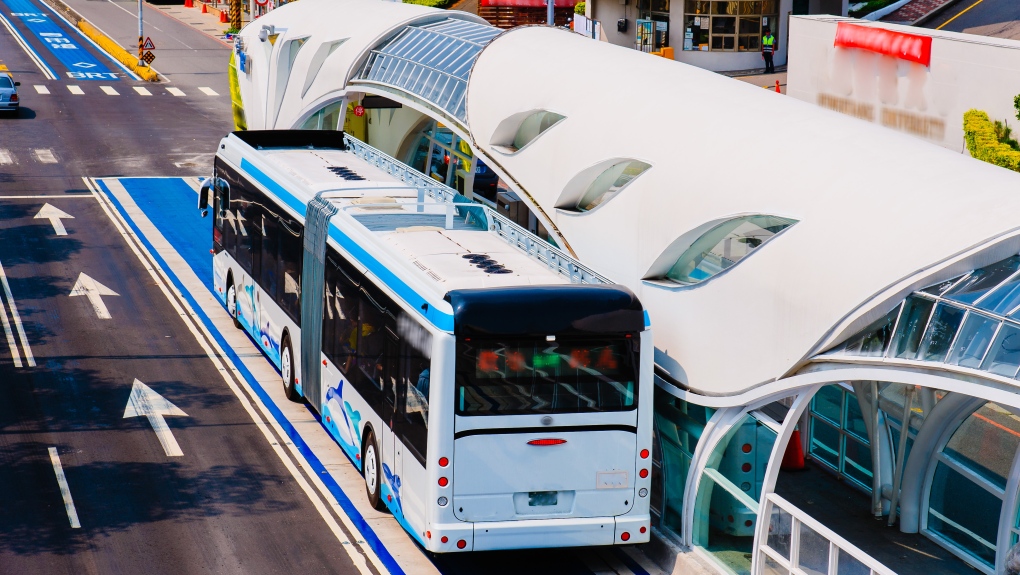TransLink adopts 10-year priorities, emphasizes Bus Rapid Transit
 An example of Bus Rapid Transit in Taiwan is seen in this image provided by TransLink.
An example of Bus Rapid Transit in Taiwan is seen in this image provided by TransLink.
Metro Vancouver's regional transit provider adopted its priorities for the next 10 years last week. While some well-known projects like the SkyTrain to UBC and the SFU gondola were near the top of the list, much of the planning document is dedicated to smaller, cheaper improvements to the system.
TransLink's Transport 2050: 10-year Priorities document promises what the transit agency calls in a news release "an unprecedented increase in local bus service," with new or enhanced local service in nearly two dozen neighbourhoods, plus 11 new RapidBus lines and seven new express buses.
In all, TransLink estimates that its priorities represent a 130-per-cent increase in bus service across Metro Vancouver.
Part of that increase is intended to lay the groundwork for the introduction of Bus Rapid Transit (BRT). TransLink says "up to nine" BRT lines could be developed in the next decade, though the actual total and timeline will depend on the support of local governments.
A BRT line is, essentially, a bus that operates as if it were a SkyTrain. BRT buses run on existing roadways, but in dedicated lanes separated from regular traffic. They serve stations, rather than roadside stops, with real-time schedule information and in-station fare payment.
BRT lines also have signal priority at intersections, minimizing the amount of time passengers spend stopped at red lights.
The planning document identifies nine "BRT candidate corridors" and calls for TransLink to "identify conceptual requirements, such as alignments, right-of-way and lane reallocation needs" for each of them.
The first actual implementation of BRT in the region would not occur until TransLink's 2025 investment plan, when two to four lines would be prioritized "based on which candidate corridors have strong local government support and high likelihood of successful implementation."
The transit agency notes that support from municipalities for conceptual requirements, "particularly road space allocation," will be a key consideration in the planning process.
The nine candidate corridors are as follows:
- Hastings Street, replacing the current R5 RapidBus
- King George Boulevard from Surrey to White Rock
- Haney Place in Langley, serving 200 Street, Golden Ears and Lougheed Highway
- Lougheed Highway, replacing the current R3 RapidBus
- Lynn Valley, Lonsdale and Downtown Vancouver via the Lions Gate Bridge
- Marine Drive Station to 22nd Street Station via Marine Way
- Metrotown to Park Royal via Second Narrows
- Richmond Centre to Metrotown via the Knight Street Bridge
- Scott Road in Surrey, replacing the planned R6 RapidBus
"The heavy emphasis on BRT in these 10-Year Priorities is for good reason," reads the planning document.
"While BRT does require reallocation of traffic lanes to dedicated rapid transit running ways, its lower cost means that we can bring fast, frequent, and reliable rapid transit service more quickly and affordably and to more areas of the region than would otherwise be possible with a rail-only approach. In this way our region can realize an almost doubling of the rapid transit network in 10 short years."
TransLink's plans call for BRT buses to be zero-emission vehicles with "spacious" interiors.
CTVNews.ca Top Stories

B.C. tenants evicted for landlord's use after refusing large rent increase to take over neighbouring suite
Ashley Dickey and her mother rented part of the same Coquitlam duplex in three different decades under three different landlords.
Mountain guide dies after falling into a crevasse in Banff National Park
A man who fell into a crevasse while leading a backcountry ski group deep in the Canadian Rockies has died.
Expert warns of food consumption habits amid rising prices
A new survey by Dalhousie University's Agri-Food Analytics Lab asked Canadians about their food consumption habits amid rising prices.
MPP Sarah Jama asked to leave Ontario legislature for wearing keffiyeh
MPP Sarah Jama was asked to leave the Legislative Assembly of Ontario by House Speaker Ted Arnott on Thursday for wearing a keffiyeh, a garment which has been banned at Queen’s Park.
Charlie Woods, son of Tiger, shoots 81 in U.S. Open qualifier
Charlie Woods failed to advance in a U.S. Open local qualifying event Thursday, shooting a 9-over 81 at Legacy Golf & Tennis Club.
Ex-tabloid publisher testifies he scooped up possibly damaging tales to shield his old friend Trump
As Donald Trump was running for president in 2016, his old friend at the National Enquirer was scooping up potentially damaging stories about the candidate and paying out tens of thousands of dollars to keep them from the public eye.
Here's why provinces aren't following Saskatchewan's lead on the carbon tax home heating fight
After Prime Minister Justin Trudeau said the federal government would still send Canada Carbon Rebate cheques to Saskatchewan residents, despite Saskatchewan Premier Scott Moe's decision to stop collecting the carbon tax on natural gas or home heating, questions were raised about whether other provinces would follow suit. CTV News reached out across the country and here's what we found out.
Montreal actress calls Weinstein ruling 'discouraging' but not surprising
A Montreal actress, who has previously detailed incidents she had with disgraced Hollywood producer Harvey Weinstein, says a New York Court of Appeals decision overturning his 2020 rape conviction is 'discouraging' but not surprising.
Caleb Williams, Jayden Daniels and Drake Maye make it four NFL drafts with quarterbacks going 1-3
Caleb Williams is heading to the Windy City, aiming to become the franchise quarterback Chicago has sought for decades.

































